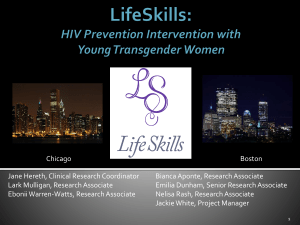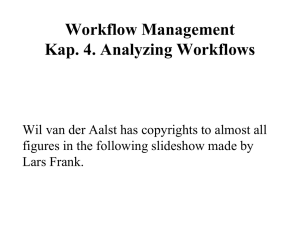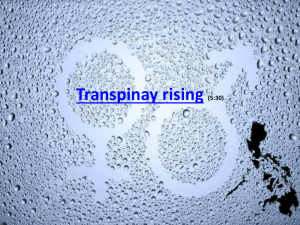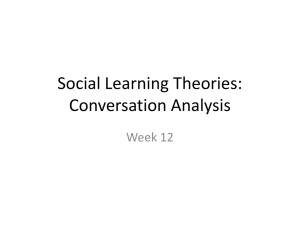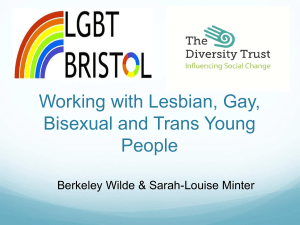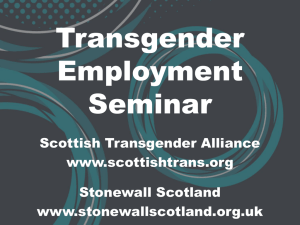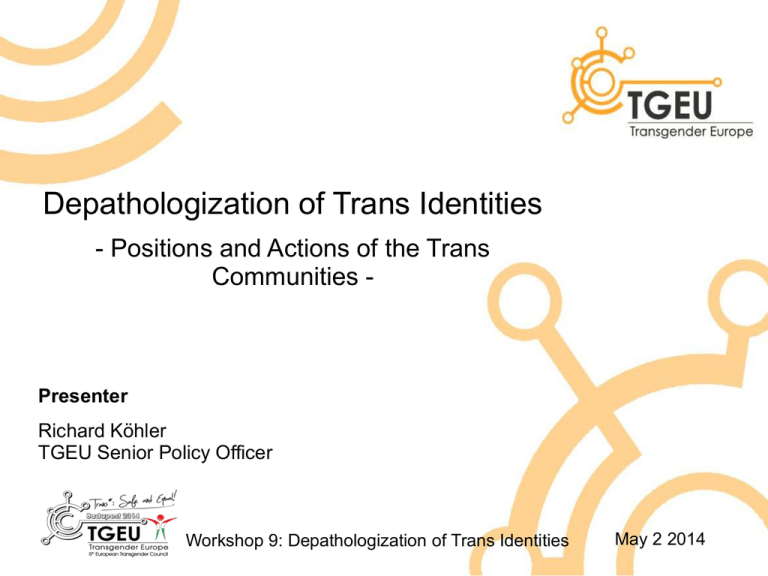
Depathologization of Trans Identities
- Positions and Actions of the Trans
Communities -
Presenter
Richard Köhler
TGEU Senior Policy Officer
Workshop 9: Depathologization of Trans Identities
May 2 2014
Outline
1. Impact of Pathologization on the every day lifes of
transgender people
2. Actions of the Trans Community
3. TGEU position towards depathologization
Workshop 9: Depathologization of Trans Identities
May 2 2014
1. The Impact of Pathologization on
the Lives of Trans People
Workshop 9: Depathologization of Trans Identities
May 2 2014
Diagnosis and access to medical
sex reassignment treatment
In almost all countries in the world a diagnosis of
transsexuality or similar (depending on the version of
the ICD or its local adaptation) is a prerequisite for
medical sex reassignment measures.
Exceptions include:
●
●
●
Argentina where access to medical sex reassignment measures and
coverage through the healthcare system are based on informed
consent (Gender identity law, §11)
Some US based clinics like the Callen Lorde Community Center, who
work on the basis of informed consent
Several clinics worldwide where medical sex reassignmentMay
measures
2 2014
Workshop 9: Depathologization of Trans Identities
are based on money
Diagnosis and legal gender
recognition
In all member states of the CoE that provide for legal gender
recognition require a diagnosis or similar evaluation for a
change of legal gender (and name in most countries).
→ a change of the ICD might have legal implications in
several countries in Europe in this respect!
Workshop 9: Depathologization of Trans Identities
May 2 2014
Stigmatization as mentally ill
According to a study of the Berlin Lesbenberatung,(62%) said
that the fact that their identity was a „mental disorder“
caused a high level of distress, 53% reported that the legal
recognition procedure caused so much distress that it
negtively impacted their every day lifes.
Several studies over the last years suggest that medical and
or psychological pathologization correlates with social
discrimination of transgender persons.
Workshop 9: Depathologization of Trans Identities
May 2 2014
Challenges in depathologization
Content:
Find balance between the wish to end pathologization of
trans indentities and the wish to guarantee access to trans
related healthcare.
Structure:
Requires global approach
WHO reform process of ICD is cumbersome and
intransperant and irresponsive of human rights discourse
Workshop 9: Depathologization of Trans Identities
May 2 2014
Different approaches to
depathologization: Discussion in
the trans community
Four main suggestions have been discussed:
●
●
●
●
Radical approach: complete removal of all diagnoses
in relation to gender identity (F64.0 and others)
Moving approach: Move the diagnosis to a own
category or at least move it away from the mental
health section
Starfish model: Delete the F64 diagnoses and
distribute various aspects of transgender health to
different parts of the ICD 11
Conservative
approach:
leaveofitTrans
as Identities
it is / modify
May 2the
2014
Workshop
9: Depathologization
content slighly but leave the diagnosis where it is
2. Actions of the Trans Communities
Workshop 9: Depathologization of Trans Identities
May 2 2014
International Campaign Stop
Trans Pathologization –
STP2012
Workshop 9: Depathologization of Trans Identities
May 2 2014
International Campaign Stop
Trans Pathologization –
STP2012
●
●
●
●
●
●
Started in 2007 by a group of activists from Spain
It has been one of the first global campaigns of the trans
community
Since 2007 STP calls for a day of action each year (this year
on October 19)
2013: actions of more than 100 groups in 48 cities around the
globe
In total more 370 groups around the globe have supported
STP2012 over the last seven years
The demands of STP have developed over time
Workshop 9: Depathologization of Trans Identities
May 2 2014
Key demands STP
Removal of the diagnostic categories ‘Gender Dysphoria’ / ‘Gender
Identity Disorders’ and ‘Transvestic Disorder’ / ‘Fetishistic
Transvestism’ from the diagnostic manuals DSM and ICD,
Public coverage of trans health care
Substitution of the current assessment model by an approach focused on
autonomy, informed decision making and accompaniment
Introduction of a non-pathologizing reference of trans health care in the
ICD-11, as a health care process not based on illness or mental
disorder
Removal of gender incongruence in childhood
Workshop 9: Depathologization of Trans Identities
May 2 2014
Towards a common global
postition: Expert meetings of
GATE
Global Action for Transgender Equality organized a series of
meetings with activists from all around the globe to address
the issue of trans depathologization:
1. Sao Paolo, December 2010
2. The Hague, November 2011
→ It's time for reform publication
3. Buenos Aires, April 2013
Workshop 9: Depathologization of Trans Identities
May 2 2014
Miracles: DG SANCO for
Depathologization!
In 2012 Tonio Borg took the position of Commissioner for Health
and Consumer Policy
Borg committed to working towards the depathologization of trans
identities on WHO level.
Since then following actions have happened:
●
●
●
High level meeting between ILGA-E, TGEU and Borg's cabinet
Meeting of diplomats to the WHO of the EU Memberstates to
coordinate actions in relation to Depath
Activation of TGEU and ILGA-E members to brief their national
representatives working on the ICD reform
Workshop 9: Depathologization of Trans Identities
May 2 2014
3. The position of TGEU
Workshop 9: Depathologization of Trans Identities
May 2 2014
Removal of F64 categories
TGEU suggests to remove the trans related diagnoses Transsexualism
(F 64.0), Dual – Role Transvestism (F 64.1), Gender Identity Disorder
of Childhood (F 64.2), Other Gender Identity Disorders (F 64.8),
Gender Identity Disorder, unspecified (F 64.9), Fetishism (F65.0)
Fetishistic Transvestism (F 65.1), Multiple Disorders of Sexual
Preference (F65.6), Disorders of Sexual Preference, unspecified
(F65.9) Sexual Maturation Disorder (F 66.0), Egodystonic Sexual
Orientation (F 66.1), Sexual Relationship Disorder (F 66.2), Other
Psychosexual Development Disorders (F 66.8) and Psychosexual
Development Disorder, Unspecified (F 66.9) completely;
Workshop 9: Depathologization of Trans Identities
May 2 2014
Creation of new category
TGEU suggest to create a new stand alone chapter labeled gender
incongruence that contains one diagnosis “Gender Incongruence in
Adolescence and Adulthood”;
Workshop 9: Depathologization of Trans Identities
May 2 2014
Diagnostic criteria
TGEU suggests a diagnosis to be based on criteria such as:
A desire to be treated (that is to live and be accepted) according to one’s
gender identity; or
a desire or a need to have the primary or secondary sex characteristics
or a discomfort to not have the primary or secondary sex
characteristics corresponding with the person's gender identity; or
a dislike or discomfort with the primary and/or secondary sex
characteristics or the desire or need to be rid of some or all primary
and/or secondary desire as these characteristics conflict with the
perceived gender identity of the person.
Workshop 9: Depathologization of Trans Identities
May 2 2014
Removal of gender identity
disorder in childhood
TGEU does not see a need for a diagnosis of gender identity disorder
in childhood in the ICD 11. The clinical needs of pre-pubescent
children for psychotherapy and/or psychosocial counselling can be
adequately covered in chapter XXI (Z) Factors Influencing health
status and contact with health services.
Workshop 9: Depathologization of Trans Identities
May 2 2014



